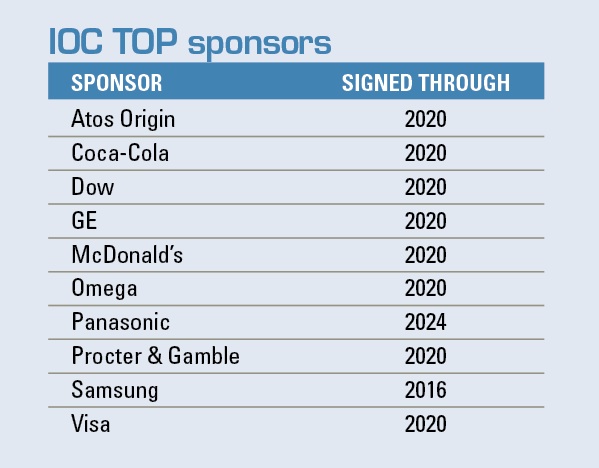The International Olympic Committee has set a new price point for TOP sponsorships, nearly doubling the cost of four-year global sponsorships from $100 million to $200 million.
{podcast}
SBJ Podcast:
From Sochi: SBJ Olympics writer Tripp Mickle and Tom Shepard, former Visa marketer and current 21 Marketing partner, discuss the Sochi Games and how partners are faring on the ground.
Panasonic last week became the first TOP partner to sign an agreement beyond 2020. Sources familiar with the deal said the eight-year sponsorship, which runs from 2017 to 2024, is worth $350 million to $400 million overall.
IOC TV and marketing services director Timo Lumme declined to discuss financial details but said that the IOC had secured an increase.
“The last pricing [of TOP] was done in 2005 to 2010, so it’s appropriate for there to be a repricing, and the price increases are significant, which reflects the value of the TOP program,” Lumme said.
Since 2005, four-year TOP sponsorships have been valued at $100 million to $120 million. (TOP prices vary from category to category.) The Panasonic deal has the potential to increase TOP prices to $175 million to $200 million over four years and could allow the IOC to increase its sponsorship revenue from $1 billion to as much as $2 billion for the 2021 to 2024 period.
“We’ve always said the program has been undervalued the last five or 10 years, and if they’ve corrected the pricing, it’s long overdue,” said Rob Prazmark, founder of 21 Marketing, which evaluated the TOP program for the IOC in 2009. “Those numbers will be difficult for some companies to adjust to, but other corporations will step up and fill the void of those that decide not to keep pace because of the value there.”
Related stories:
The Panasonic deal, which was announced just before the Sochi Games opened, caught the IOC’s other TOP partners by surprise. At a workshop last year, the IOC had said it was considering changing the TOP program and didn’t plan to sign any deals beyond 2020.
Coca-Cola, Dow, Procter & Gamble, Visa, GE, Omega, McDonald’s and Atos Origin had all signed deals through 2020. Only Panasonic and Samsung had deals that ended in 2016.
Following the IOC’s selection of Tokyo as the host city of the 2020 Olympics, Panasonic was eager to sign a new deal. The IOC, which prefers to sign eight-year deals, took advantage of the company’s interest to secure a huge price increase and set the future value of TOP.
Executives at Coca-Cola, which had always been the first TOP sponsor to extend its Olympics deal, were not happy about the extension, according to sources. Other TOP sponsors were frustrated by the IOC’s move.
“They told us one thing and then did another,” an executive with a TOP sponsor said. “What changed?”
At the IOC session in Argentina last fall, Lumme said the IOC was looking to increase prices and possibly reduce the number of global sponsors from 10 to 12 to five to six. He said last week the IOC could still change TOP’s structure and opt to have fewer partners, but for now, the plan is to preserve the status quo.
The IOC is in extension talks with Samsung and plans to open negotiations with other TOP partners soon. It also is looking at adding one or two new sponsors in industrial and consumer categories.
“We’re in the fortunate position where we could stop the program now, but we’re not going to,” Lumme said.
Lumme said that the IOC is looking to deliver more value to the sponsors. It is exploring ways to have signage in future Olympic Parks, looking to create programs for sport development and hoping to develop an Olympic network that offers new media value.
“The core proposition as a global program that gives exclusivity in a category across all Olympic stakeholders won’t change,” Lumme said. “What may change is what we put into the pot in terms of goodies (and) the way we allow partners to activate.”




